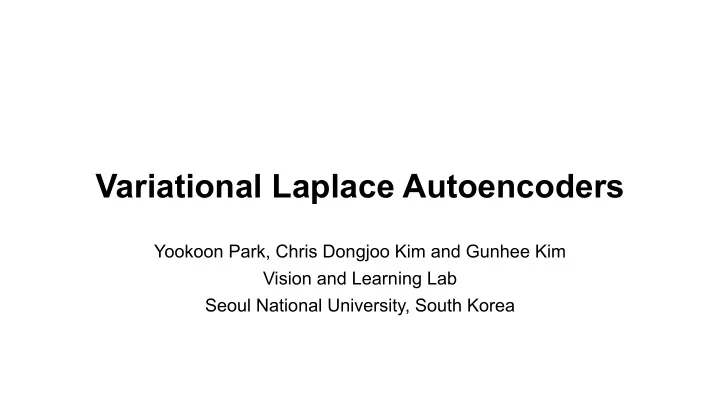

Variational Laplace Autoencoders Yookoon Park, Chris Dongjoo Kim and Gunhee Kim Vision and Learning Lab Seoul National University, South Korea
Introduction - Variational Autoencoders - Two Challenges of Amortized Variational Inference - Contributions
Variational Autoencoders (VAEs) • Generative network 𝜄 𝑞 # 𝐲 𝐴 = 𝒪(𝒉 # 𝐴 , 𝜏 , 𝐉) , 𝑞 𝐴 = 𝒪(𝟏, 𝐉) • Inference network 𝜚 : amortized inference of 𝑞 # 𝐴 𝐲 , (𝐲) ) 𝑟 2 𝐴 𝐲 = 𝒪(𝝂 2 𝐲 , diag 𝝉 2 • Networks jointly trained by maximizing the Evidence Lower Bound (ELBO) ℒ 𝐲 = 𝔽 ; log 𝑞 # 𝐲, 𝐴 − log 𝑟 2 𝐴 𝐲 = log 𝑞 # 𝐲 − 𝐸 @A (𝑟 2 𝐴 𝐲 ∥ 𝑞 # 𝐴 𝐲 ) ≤ log 𝑞 # (𝐲) Kingma, D. P. and Welling, M. Auto-encoding variational bayes. In ICLR , 2014. Rezende, D. J., Mohamed, S., and Wierstra, D. Stochastic backpropagation and approximate inference in deep generative models. In ICML , 2014
Two Challenges of Amortized Variational Inference 1. Enhancing the expressiveness of 𝑟 2 𝐴 𝐲 • The full-factorized assumption is restrictive to capture complex posteriors • E.g. normalizing flows (Rezende & Mohamed, 2015; Kingma et al., 2016) 2. Reducing the amortization error of 𝑟 2 𝐴 𝐲 • The error due to the inaccuracy of the inference network • E.g. gradient-based refinements of 𝑟 2 𝐴 𝐲 (Kim et al, 2018; Marino et al., 2018; Krishnan et al. 2018) Rezende, D. J. and Mohamed, S. Variational inference with normalizing flows. In ICML , 2015. Kingma, D. P., Salimans, T., Jozefowicz, R., Chen, X., Sutskever, I., and Welling, M. Improved variational inference with inverse autoregressive flow. In NeurIPS , 2016. Kim, Y., Wiseman, S., Millter, A. C., Sontag, D., and Rush, A. M. Semi-amortized variational autoencoders. In ICML , 2018. Marino, J., Yisong, Y., and Mandt, S. Iterative amortized inference. In ICML , 2018. Krishnan, R. G., Liang, D., and Hoffman, M. D. On the challenges of learning with inference networks on sparse high-dimensional data. In AISTAT , 2018.
Contributions • The Laplace approximation of the posterior to improve the training of latent deep generative models with: 1. Enhanced expressiveness of full-covariance Gaussian posterior 2. Reduced amortization error due to direct covariance computation from the generative network behavior • A novel posterior inference exploiting local linearity of ReLU networks
Approach - Posterior Inference using Local Linear Approximations - Generalization: Variational Laplace Autoencoders
Observation 1: Probabilistic PCA • A linear Gaussian model (Tipping & Bishop, 1999) 𝑞(𝐴) = 𝒪 𝟏, 𝐉 𝑞 # 𝐲 𝐴 = 𝒪(𝐗𝐴 + 𝐜, 𝜏 , 𝐉) • The posterior distribution is exactly 1 𝜏 , 𝚻𝐗 𝐔 𝐲 − 𝐜 , 𝚻 𝑞 # 𝐴 𝐲 = 𝒪 NO 1 𝜏 , 𝐗 𝐔 𝐗 + 𝐉 where 𝚻 = Toy example . 1-dim pPCA on 2-dim data Tipping, M. E. and Bishop, C. M. Probabilistic Principal Component Analysis. J. R. Statist. Soc. B , 61(3):611–622, 1999.
Observation 2: Piece-wise Linear ReLU Networks • ReLU networks are piece-wise linear (Pascanu et al., 2014; Montufar et al., 2014) 𝒉 # 𝐴 ≈ 𝐗 𝐴 𝐴 + 𝐜 𝐴 • Locally equivalent to probabilistic PCA 𝑞 # 𝐲 𝐴 ≈ 𝒪(𝐗 𝐴 𝐴 + 𝐜 𝐴 , 𝜏 , 𝐉) Toy example . 1-dim ReLUVAE on 2-dim data Pascanu, R., Montufar, G., and Bengio, Y. On the number of response regions of deep feedforward networks with piecewise linear activations. In ICLR , 2014. Montufar, G., Pascanu, R., Cho, K., and Bengio, Y. On the number of linear regions of deep neural networks. In NeurIPS , 2014.
Posterior Inference using Local Linear Approximations Linear models give exact ReLU networks are posterior distribution locally linear Observation 2 Observation 1 Posterior approximation based on the local linearity
Posterior Inference using Local Linear Approximations 1. Iteratively find the posterior mode 𝝂 where the density is concentrated • Solve under the linear assumption 𝒉 # 𝝂 𝒖 ≈ 𝐗 𝒖 𝝂 R + 𝐜 𝒖 NO 𝝂 RSO = 1 1 𝐔 𝐲 − 𝐜 𝐔 𝐗 R + 𝐉 𝜏 , 𝐗 R 𝐗 R 𝜏 , • Repeat for T steps 2. Posterior approximation using 𝑞 # 𝐲 𝐴 ≈ 𝒪(𝐗 𝝂 𝐴 + 𝐜 𝝂 , 𝜏 , 𝐉) NO 1 𝐔 𝐗 𝝂 + 𝐉 𝑟 𝐴 𝐲 = 𝒪 𝝂, 𝚻 , where 𝚻 = 𝜏 , 𝐗 𝝂
Generalization: Variational Laplace Autoencoders 1. Find the posterior mode s.t. ∇ 𝐴 log 𝑞 𝐲, 𝐴 | 𝐴V𝝂 = 0 • Initialize 𝝂 X using the inference network • Iteratively refine 𝝂 R (e.g. use gradient-descent) 2. The Laplace approximation defines the posterior as: 𝑟 𝐴 𝐲 = 𝒪 𝝂, 𝚻 , where 𝚻 N𝟐 = 𝚳 = −∇ 𝐴 , log 𝑞 𝐲, 𝐴 | 𝐴V𝝂 3. Evaluate the ELBO using 𝑟 𝐴 𝐲 and train the model
Results - Posterior Covariance - Log-likelihood Results
Experiments • Image datasets: MNIST, OMNIGLOT, Fashion MNIST, SVHN, CIFAR10 • Baselines • VAE • Semi-Amortized (SA) VAE (Kim et al, 2018) • VAE + Householder Flows (HF) (Tomczak & Welling, 2016) • Variational Laplace Autoencoder (VLAE) • T=1, 2, 4, 8 (number of iterative updates or flows)
Posterior Covariance Matrices
Log-likelihood Results on CIFAR10 2390 2370 2350 VAE SA-VAE VAE+HF VLAE T=1 T=2 T=3 T=4
Thank you Visit our poster session at Pacific Ballroom #2 Code available at : https://github.com/yookoon/VLAE
Recommend
More recommend